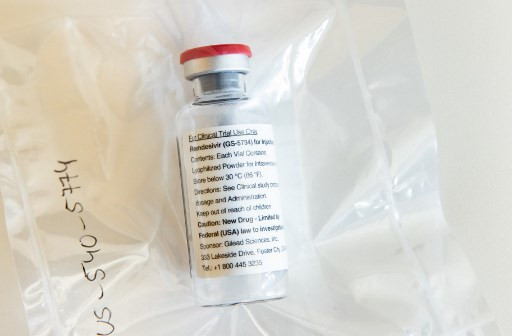Popular Reads
Top Results
Can't find what you're looking for?
View all search resultsPopular Reads
Top Results
Can't find what you're looking for?
View all search resultsUS says remdesivir shows 'clear-cut' effect in treating coronavirus
Fauci said "the data shows that remdesivir has a clear-cut, significant, positive effect in diminishing the time to recovery," adding that it proves "that a drug can block this virus."
Change text size
Gift Premium Articles
to Anyone
 In this file photo one vial of the drug Remdesivir is seen during a press conference about the start of a study with the Ebola drug Remdesivir in particularly severely ill patients at the University Hospital Eppendorf (UKE) in Hamburg, northern Germany on April 8, 2020, amidst the new coronavirus COVID-19 pandemic. The experimental antiviral drug remdesivir has failed in its first randomized clinical trial to treat the COVID-19 illness, reports said on April 23, 2020, quoting draft documents that were accidentally published by the World Health Organization. (AFP/Ulrich Perrey)
In this file photo one vial of the drug Remdesivir is seen during a press conference about the start of a study with the Ebola drug Remdesivir in particularly severely ill patients at the University Hospital Eppendorf (UKE) in Hamburg, northern Germany on April 8, 2020, amidst the new coronavirus COVID-19 pandemic. The experimental antiviral drug remdesivir has failed in its first randomized clinical trial to treat the COVID-19 illness, reports said on April 23, 2020, quoting draft documents that were accidentally published by the World Health Organization. (AFP/Ulrich Perrey)
R
emdesivir has a "clear-cut" effect in helping COVID-19 patients recover, a top US scientist who oversaw a large clinical trial into the highly-anticipated antiviral said Wednesday, hailing it as proof that a drug can block the coronavirus.
Anthony Fauci made the remarks at the White House shortly after the medicine's maker, Gilead Sciences, revealed it had met its primary goals in the largest and most robust investigation to date.
Fauci said "the data shows that remdesivir has a clear-cut, significant, positive effect in diminishing the time to recovery," adding that it proves "that a drug can block this virus."
The National Institute of Allergy and Infectious Diseases, which Fauci leads, is soon expected to release a detailed summary of the results, so it remains difficult to quantify exactly how well the drug performed.
Nevertheless, it represents the first time any medication has been shown to improve outcomes against the COVID-19 illness, which has claimed more than 200,000 lives globally and brought the world economy to a grinding halt.
There had been mixed news about the intravenous antiviral in recent weeks. A summary of results posted on the website of the World Health Organization last week showed it failed in a smaller Chinese trial. The Lancet on Wednesday published the formal paper describing that experiment.
In this study of 237 patients in Wuhan, China, doctors found no positive effects of administering the drug compared with a control group of adults, except for those patients who required ventilators.
But the Chinese test had to be halted early because it could not recruit enough people to meet its initial goals, and was considered by many experts to be too small to draw reliable conclusions from.
Fauci said it was "not an adequate study."
The US-led trial, however, which began in late February, is thus far the largest to investigate remdesivir and is technically the most robust.
According to a data sheet, its estimated enrollment was 800 patients, a portion of whom received the drug while the rest received a placebo, with the trial conducted at multiple sites across the world.
Neither the patients nor their physicians were aware of which group they belonged to, in order to eliminate unconscious bias.
Time to recovery
Its main goal was to evaluate how long patients take to recover on versus off the drug -- with three different categories of recovery: hospitalized but no longer needing oxygen; discharged from hospital but still limited in their home activities; and discharged from hospital with no limits on home activities.
Without numeric data it is hard to judge just how well patients did but Gilead's statement indicates there was an overall improvement over the placebo.
It is a Phase 3 trial, the final stage before any medication can receive regulatory approval from the Food and Drug Administration (FDA).
Remdesivir, which previously failed in trials against Ebola, belongs to a class of drugs that act on the virus directly -- as opposed to controlling the abnormal and often lethal autoimmune response it causes.
It mimics one of the four building blocks of RNA and DNA and gets absorbed into the virus's genome, which in turn stops the pathogen from replicating.
The antimalarial drugs hydroxychloroquine and chloroquine are also being widely used against COVID-19 on a so-called "compassionate basis" pending results from large trials, with early studies decidedly mixed.
Other therapies that are being studied include collecting antibodies from COVID-19 survivors and injecting them in patients, or harvesting antibodies from genetically-engineered mice that were deliberately infected.









